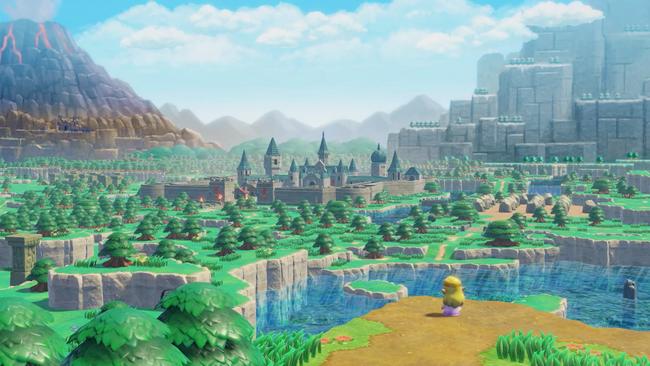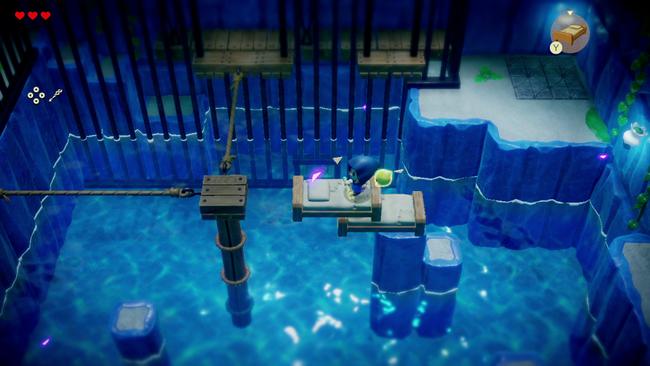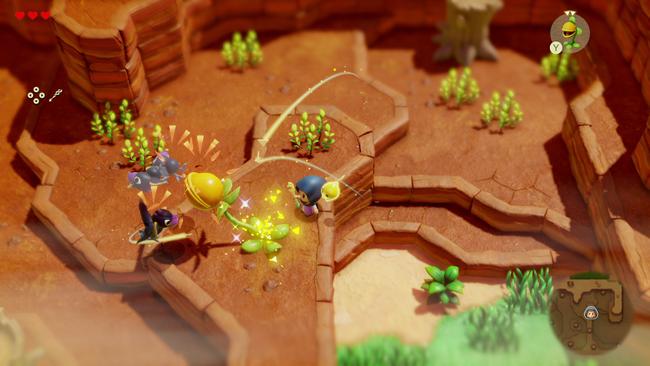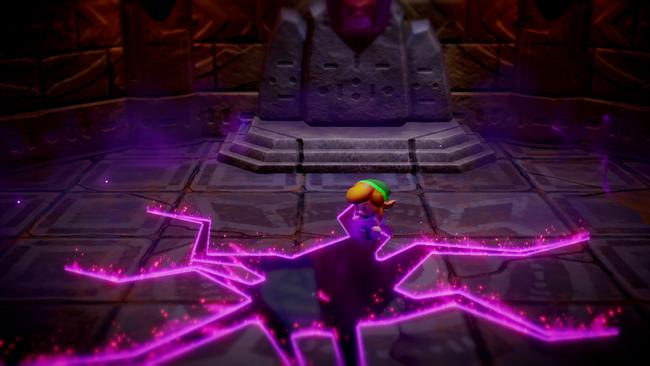
The Legend of Zelda: Echoes of Wisdom Review
In a series with a rich history, the concept of The Legend of Zelda: Echoes of Wisdom immediately invited a question - exactly what sort of Zelda game would this be? Clearly, with a protagonist switch-up it’ll be something new - but nevertheless, much can likely be gleaned from where the game takes its design, tone, and vibe cues. Echoes of Wisdom is ultimately quite hard to define - because in truth, it’s a bit of a mash-up.
Princess Zelda’s first adventure as protagonist (we’ll discount that non-Nintendo one) basically draws inspiration from three different pillars of the series. As a ‘handheld Zelda’ in style if nothing else, the shadow of Link's Awakening and its successors looms large; the toybox art style from the LA remake is given a glorious second run-out here. As a 2D, top-down Zelda, much of its existence is owed to A Link to the Past and its direct sequel, Worlds. But the most plain influence is obviously Breath of the Wild - which asserts its status as the new status quo for the Zelda series in this latest adventure.
Initially, that was the first bit of Echoes of Wisdom that sparked joy - seeing the visual style and the systems design of Breath of the Wild and Tears of the Kingdom translated into the world of 2D Zelda.

It feels like a real moment of the old meeting the new; here is an overworld that is broadly evocative of that of A Link to the Past, but also one that quite deliberately evokes the different biomes of BOTW’s Hyrule. The user interface is practically entirely pulled from the larger-scale games, too - when you get a side quest, it looks the same. The same icons and speech bubbles populate over the heads of characters to indicate they have something to say. When you trigger their quest, the same sound effects chirp off to signify the beginning of a new quest.
It’s not just the visual, though - the structure also seeps into the very core of this spin-off’s design. The logic is that Zelda is a Princess, not a fighter - and so perhaps unsurprisingly, her skill-set is based around magic - and a particular new magical gimmick. Gimmicks are common in Zelda, of course - but rather than an item-based gimmick-per-dungeon, as is 2D Zelda tradition, Echoes of Wisdom follows the Breath of the Wild mantra by giving you some core skills early on, then letting you use them to solve puzzles in clever and sometimes completely unexpected ways.
Zelda’s new power is to create ‘echoes’ - thus the title - magical recreations of items out in the world. Echoes can be more or less anything. You might choose to create an echo of a tree, dropping a new piece of shrubbery into the game world. You might create a bed, either to sleep in or to use as a handy platform for climbing or crossing gaps. You might also create monsters and various other beasts to fight for you, since Zelda herself has no direct combat abilities. There are hundreds of Echoes to choose from, each found and learned out in the game world. Once placed into the world, these objects can be manually picked up if they’re light enough, or magically moved around the world with an Ultrahand-like ability that also comes in handy for puzzle solving.
While there’s a cap on how many echoes you can summon at once (which grows over the course of a game - a key progression blocker), the logic for their use is very BOTW-like - you can summon anything, anywhere, and use them to surprising ends. Basically, you can do what you want. Because each of the hundreds of echoes is different (some more different than others, mind), interesting combinations can have creative, weird, or clever uses. Or, y'know, you can get around by creating stairs out of beds. That becomes a stalwart.

Early on, with very few echoes in my inventory, I found myself able to use a tree and a trampoline to just about nab an out-of-reach collectible. It’s intended, obviously - though my solution was definitely not the standard route to that item. I’d basically brute-forced it with the tools I had available - and in that, you feel like a bit of a genius. This spark of feeling extremely special and clever for finding an offbeat solution to a problem didn’t fade for me through the entire game’s run-time; it’s joyous.
This is an entire game of that, basically. There’s a touch of structure in that you’ll be pointed towards a few different zones at a time, of course. At first, the game gently nudges: check out the Gerudo and Zora areas. These are your first two dungeons, and can be tackled whichever way around you prefer. You’re also welcome to just try to explore as deeply into Hyrule as you can - the world is your oyster. After the first two named dungeons are finished, even more options open up for the next phase - and so on. Within that, though, there is freedom to do things your way.
Occasionally in dungeons or caves you’ll have a more prescribed puzzle, where you’re introduced to a new echo and then immediately given a puzzle or two that demands you use that new power. But on the whole, you’re free to experiment. Again, there’s that BOTW-esque flow of each puzzle clearly having an ‘intended’ solution with set items and mechanics that have been tactfully placed around - but you also have the option of gloriously brute-forcing things just ‘cos.
All of this works well. Or well enough, at least. As the game wore on, I began to get the feeling that every system was running at about eighty percent capacity of what it could actually achieve. Echoes of Wisdom is brilliant, but it also routinely misses opportunities.

Some systems I just don’t quite get. There’s a recipe system for crafting smoothies that reminds me both of BOTW and of Ring Fit Adventure (which shares an engine and much technology with the newer Zeldas) - but the buffs gained from these items feel fairly unnecessary, except for those that help you deal with environmental hazards like extreme hot or cold weather. The ability to transform into ‘Swordfighter’ form, which is basically Link, is neat - but it feels like such a cheat and such a betrayal of the game’s core ideas that I deliberately avoided using it except for when it was strictly necessary.
The biggest missed opportunity is doubtless in the use of Zelda herself. For one, the abilities she has feel rather generic - they’re not things I particularly associate with any iteration of the character, be that the ninja-like Sheik, the confident archer of Wind Waker and Twilight Princess, or even just the magic wielder we see in Smash. Echoes feel like the standard sort of Zelda series gimmick that could’ve just as easily been grafted on to Link - which is a problem that becomes a bit of a theme.
For some reason, Zelda is mute in this game. Zelda has been talking to the player since 1986, but Zelda games feature silent audience-insert characters - so this Zelda is silent. When the time came to visit Gerudo town, I thought – ‘Aha! This will be different’. For years, Link has been sneaking into Gerudo towns by costume, stealth, or deception, the only way a man can enter their female-only society. Zelda can indeed walk into the town no questions asked - but then there’s simply a different blocker, slightly deeper into town, that ultimately serves the same function. The trope is fulfilled. It feels a little tired. It feels a little rote.
I suppose what I’m saying is that throughout this game, much as I enjoyed it, I never really felt much like I was actually embodying Zelda. It’s cute and all - but all of this could’ve been Link. In that sense I’d consider that a rather un-Nintendo like failure of this game’s core concept. People have been asking for a Zelda game for years; they finally got one - but not really. The inclusion of Swordfighter mode feels like the ultimate representation of this cop-out - when the going gets tough, you can literally turn into Link.

At the same time, my Miyamoto mind argues that all of that is story, narrative, visuals - it’s all set dressing. It’s the game bit that matters. There is some merit to that argument. And yet… My disappointment is palpable.
In true Nintendo fashion, there’s a really clever idea at the heart of this game, and that idea cuts right through any disappointing aspects. There’s definitely an element of ‘your mileage may vary’ - but if you enjoy breaking puzzles in unexpected ways and just making mechanics and systems mash together in order to surprise and delight, the echo system is going to speak to you as it did to me. I could lose hours to that system - but it doesn’t arrive fully-formed as the glorious physics puzzles of Breath of the Wild did. It arrives with significant gaps - ones that I do hope get explored in future games.
The result is a game that is the definition of a truly mixed experience - but if you take the rough and under-developed with the smooth and innovative, there’s a lot of fun to be had. The Legend of Zelda: Echoes of Wisdom is perhaps a victim of being part of a series that has one of the highest batting averages of any franchise out there - what is ‘good’ by Zelda standards is great to many other franchises and publishers. This is by no means the earth-shaker that some Zelda games are - but it sits up there with many other classic 2D Zeldas just fine. I just wish Zelda herself felt a bit more defined and present throughout, given this is her first true playable debut.